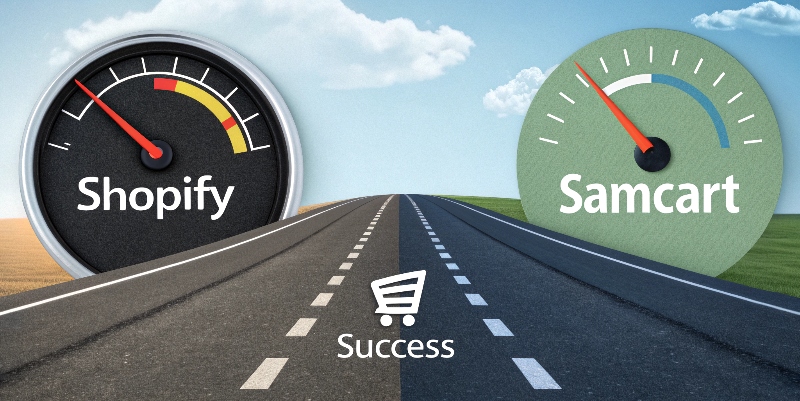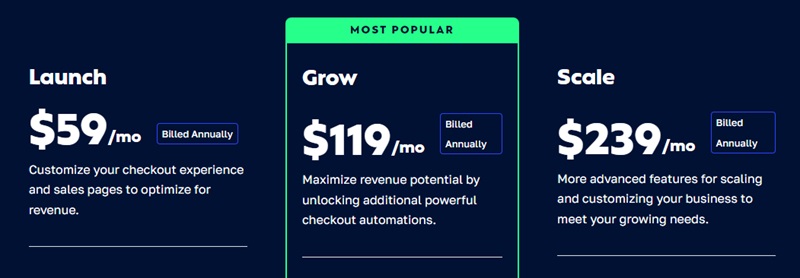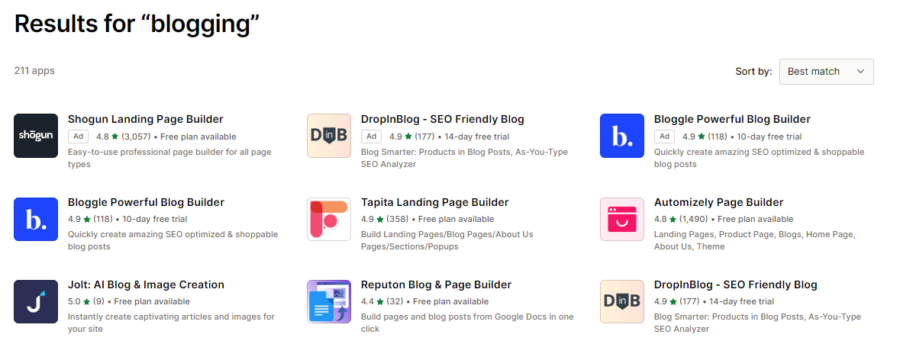My content is reader-supported by awesome people like you. Which means I could earn a commission. Learn more here!
Imagine this—you’ve got the perfect product idea, a dream of running a successful online store, and the motivation to make it happen.
But before you can even make your first sale, you hit a roadblock:
Which platform should you choose?
Shopify and SamCart are both powerful tools, but they cater to very different needs.
Pick the wrong one, and you could end up frustrated with unnecessary fees, a clunky checkout process, or missing features that could cost you sales.
Pick the right one, and you’ll have a smooth, optimized e-commerce machine that works for you, not against you.
In this head-to-head comparison, we’ll break down Shopify vs. SamCart—focusing on their strengths, weaknesses, and which one is the best fit for your e-commerce journey.
Let’s dive in and find out which platform will help you sell smarter, not harder!

Comparison Chart For Samcart And Shopify
| Feature | Shopify | SamCart |
|---|---|---|
| Best For | Entrepreneurs & businesses want a full eCommerce store that can scale with them. | Digital product sellers, course creators, & businesses focused on high-converting checkout pages |
| Platform Type | Comprehensive eCommerce platform with full store functionality | Checkout-focused sales platform with one-page funnels |
| Ease of Use | Easy to set up, but requires learning product management & customization | Very simple setup; designed for quick checkout and sales page creation |
| Design & Customization | Huge theme selection, drag-and-drop builder, and extensive customization with AI to help build this out. | Limited design options, but optimized for conversion |
| Product Types | Physical & digital products, services, subscriptions | Primarily digital products, courses, memberships |
| Sales Funnel & Checkout | Basic checkout pages; and advanced sales funnels require third-party apps | Optimized one-page checkout, upsells, and A/B testing for higher conversions |
| Payment Processing | Supports PayPal, Stripe, Shopify Payments (2.9% + 30¢ per transaction) | Supports Stripe, PayPal, and other gateways (0% transaction fees) |
| Marketing & SEO | SEO-friendly, blogging tools, abandoned cart recovery, and email marketing integrations | Email marketing built-in, A/B testing, upsell & order bump features |
| Integrations | Extensive app marketplace for third-party tools | Limited integrations, but includes major marketing platforms |
| Support | 24/7 chat, email, and phone support | Live chat and email support (no 24/7 service) |
| Pricing | Starts at $29/month (Shopify Starter Plan is $5 monthly) | Starts at $59/month |
| Free Trial | Shopify often offers a free trial then usually a $1 per month plan in the range of 1 month to 3 months. | Samcart gives you 7 days to try it out. |
| Pros | – Full eCommerce solution with inventory management – Highly customizable store designs – SEO and marketing-friendly – Supports both digital & physical products |
– Best for digital products & one-page checkouts – Built-in high-converting sales funnel tools – No transaction fees on top of processing fees – Easier setup for non-tech users |
| Cons | – More complex setup process than SamCart – Transaction fees unless using Shopify Payments – Requires additional apps for advanced sales funnels |
– Limited storefront capabilities – Not ideal for selling physical products – Less customization options than Shopify |
| Final Verdict | Shopify is the Best for businesses wanting a full eCommerce website with customization and scalability. Also, Shopify is set for your future needs as you grow and you will have to worry less about migrating away from the platform because of the tools it offers. | SamCart will be solid for digital sellers who want an optimized checkout and sales funnel system. |
Try Sam Cart Free Or Try Shopify Free
How I Like To Test These Platforms
| Ease of use | Is it easy to sign up for and is guidance there to not fail |
| Customer Support | I gotta see this somehow |
| Tools it offers (Marketing, SEO, Product Tools) | We need tools without venturing out to other companies all the time |
| 25-point feature checklist | It can be my secret sauce. It includes other areas but it lets me know how it’s doing. |
| Actual customer user ratings | I set out and find actual other users that use this product for their business. These can be on review sites, forums, or my reader’s opinions to give you an idea. |
| Testing project | I try to run it through a project I feel good about |
| Overall rating | After compiling data I give it a rating. |
Ratings Breakdown Summary
| Shopify Vs Sam Cart Ratings | Shopify | Sam Cart |
| Ease of use | 4.6 out of 5 | 2.5 out of 5 |
| Customer Support | 4.9 out of 5 | 2.8 out of 5 |
| Tools it offers (Marketing, SEO, Product Tools) | 4.6 out of 5 | 3.3 out of 5 |
| 25-point feature checklist | 4.6 out of 5 | 3.1 out of 5 |
| Testing project | 4.6 out of 5 | 3.2 out of 5 |
| Customer User Rating Score | 4.5 out of 5 based on 6,280 customer users | 3.35 out of 5 based on 141 Users |
| Overall rating Of Shopify | 4.63 out of 5 | 3.04 out of 5 |
Pros And Cons Of Sam Cart And Shopify
Sam Cart Pros |
|
Sam Cart Cons |
|
Shopify Pros |
|
Shopify Cons |
|
Core Offerings and Target Audience
Shopify offers an all-in-one eCommerce platform suitable for businesses of all sizes.
Its wide range of tools and capabilities make it a versatile solution for launching online stores and managing operations.
Shopify equips merchants with storefront building, payment processing, shipping, marketing, analytics, and more.
The platform is ideal for entrepreneurs seeking an end-to-end solution.
SamCart specializes in maximizing conversions and sales through its shopping cart and checkout optimization features.
It focuses on creating seamless, distraction-free checkout experiences to increase conversion rates.
SamCart integrates with other platforms and is suited for businesses that want to enhance their shopping carts and funnels specifically.
The platform caters to marketers and businesses laser-focused on boosting revenue.
Shopify works for varied business models and stages, from small startups to large enterprises.
Its scalability makes it a long-term solution.
SamCart has a narrower specialty, best-serving businesses concentrated on funnel optimization and conversion rate improvements.
For general ecommerce stores, Shopify offers an unbeatable range of capabilities.
But for conversion rate optimization, SamCart provides more advanced and targeted options.
Try Sam Cart Free Or Try Shopify Free
Ease of Use and User Interface
Shopify and SamCart take different approaches when it comes to usability and user experience.
Shopify aims to provide an all-in-one platform that can work for e-commerce businesses of any size and technical skill level.
The learning curve is relatively gradual, with a dashboard that focuses on simplifying core tasks like managing products, orders, and customers.
While advanced capabilities exist, the interface remains clean and intuitive enough for first-time store owners.
SamCart zeroes in on providing a seamless checkout and conversion optimization process.
The focused scope makes picking up the platform fairly straightforward.
The dashboard neatly guides you through creating funnels, A/B testing your pages, and tracking conversion performance.
However, those seeking a more fully-featured store management system may find SamCart lacking in.
Shopify likely edges out in terms of intuitive usability across the wide range of e-commerce tasks.
But for optimizing your sales funnel, SamCart wins for simplicity and clarity of purpose.
Design Customization: How Much Control Do You Want?
Shopify gives you tons of options to make your store look just how you want it. When I tested different themes, I found over 100 choices – some free, some paid.
What’s great is how easy they are to change. You can:
- Pick colors that match your brand
- Change fonts with a few clicks
- Move sections around without knowing code
I liked that even without design skills, I could make a store that looked good. If you know how to code, you can even build your own theme from scratch.
SamCart takes a different approach. Their templates focus on getting sales, not looking unique.
When testing SamCart, I noticed:
- Templates are clean and professional
- You can change basic elements (colors, logos)
- The layouts stay mostly the same
Quick takeaway: If you want a store that shows off your brand style, Shopify wins. If you just want something that sells well without much design work, SamCart might be better.
eCommerce Tools: What Can Each Platform Do?
Shopify comes packed with tools to run your whole store. When I tested the product management system, adding items and variations was simple.
Some standout features include:
- Easy product uploads (even in bulk)
- Real-time order tracking
- In-store selling options with Shopify POS
- Automatic emails for abandoned carts
- Built-in shipping with discounted rates
- Tax calculations that update automatically
- Detailed sales reports
SamCart doesn’t try to do everything – it focuses on selling better. During my tests, I was impressed with how it helps increase sales.
SamCart’s best tools are:
- Quick landing page creation
- Simple checkout pages with few distractions
- One-click upsells to boost order values
- Order bumps (adding small items at checkout)
- A/B testing to see what works best
- Clear stats about your sales funnel
Quick takeaway: Shopify works better for running a complete store with many products. SamCart is best if you have fewer products and want to maximize how many people buy.
Sales and Marketing: How Will You Get Customers?
When testing Shopify’s marketing tools, I found they cover most bases. The SEO features helped pages show up better in search results without extra work.
Shopify’s marketing strengths:
- Built-in SEO tools that are easy to use
- Connections to ad platforms like Facebook and Google
- Clear data showing where visitors come from
- Custom dashboards to track what matters to you
When I tried SamCart, it was all about making more sales from people who visit your site. The A/B testing tool let me try different versions of pages to see which sold more.
SamCart focuses on:
- Testing different checkout pages
- Tracking how many people buy
- Measuring your average order amount
- Making the buying process smoother
Quick takeaway: Shopify helps you find new customers through different channels. SamCart helps you sell more to the visitors you already have.
Payment Options: How Will You Get Paid?
Both platforms make it easy to take payments, but with some differences.
Testing Shopify’s payment options showed:
- Over 100 payment methods available
- Built-in Shopify Payments (2.9% + 30¢ per sale)
- Works with major services like PayPal and Stripe
- Better rates are possible for larger stores
When I signed up for SamCart and connected payment methods:
- Fewer options overall
- Works with popular services like PayPal and Stripe
- Standard rate of 2.9% + 30¢ per sale
- Less flexibility for big businesses
Quick takeaway: Shopify gives you more payment choices and potentially lower fees as your store grows. SamCart keeps it simple but with fewer options.
Integrations
Shopify and SamCart both integrate with a wide variety of third-party apps and services to expand their capabilities.
Shopify has a robust app store with thousands of apps that allow users to add features like accounting, shipping, marketing automation, and more.
It integrates seamlessly with popular services like Google Analytics, MailChimp, and Facebook.
The main limitation is that some niche apps may not be available.
SamCart has over 100 integrations, focusing on apps that enhance checkout and optimization.
Top integrations include webinar platforms, membership sites, email services, and affiliate programs.
The integrations aren’t quite as deep as Shopify’s, but SamCart partners with apps that complement its core offering.
One gap is accounting software – SamCart doesn’t integrate natively with popular options like QuickBooks.
Overall, Shopify offers more expansive and deeper integration capabilities.
But SamCart integrates well with apps tailored to conversion optimization and sales processes.
The choice comes down to which integrations align with your eCommerce needs and goals.
Both platforms cover the most essential integrations, but Shopify has the edge for those wanting maximum app compatibility.
Support
When it comes to customer support, Shopify and SamCart take different approaches.
Shopify offers 24/7 support via live chat, email, and phone.
They have a reputation for quick response times and resolving issues efficiently.
Their help center contains extensive documentation, guides, and a community forum for additional assistance.
SamCart’s support options are more limited – email and chat support are only available Monday-Friday.
Phone support is not offered.
Their help articles seem less robust compared to Shopify’s knowledge base.
However, SamCart users often praise the quality and friendliness of support staff.
For community support, Shopify has a thriving forum with an engaged user base.
The active discussions and peer knowledge sharing provide valuable real-world insights.
SamCart’s community forums are smaller but still helpful for finding answers and connecting with other users.
Overall, Shopify easily edges out SamCart in support coverage.
Try Sam Cart Free Or Try Shopify Free
Pricing Structures
Shopify and SamCart both offer a range of pricing tiers to suit different business needs and budgets.
Shopify has four main pricing plans:
– Basic Shopify: $39/month (They do run deals)
– Grow: $79/month
– Advanced Shopify: $299/month
– Shopify Plus: $2300 monthly with a 3-year term
The Basic Shopify plan is best for new and emerging brands wanting to test out the platform.
It includes basic sales channels and reports.
Shopify and Advanced add more advanced features like gift cards and advanced report builders.
Shopify Plus is tailored for enterprise merchants doing over $1M in revenue.
SamCart has three pricing tiers:

– Launch: $59/month
– Grow: $119/month
– Scale: $239/month
These plans cater more specifically to the business size and sales volumes.
Launch supports up to $50K in revenue, Grow up to $250K in revenue, and Scale beyond that.
When comparing value, Shopify packs more all-in-one eCommerce features per dollar spent.
But SamCart provides immense value if you just need conversion optimization and sales funnel tools.
Both platforms scale well cost-wise for growing businesses.
Shopify costs more as you upgrade plans but unlocks more advanced capabilities.
SamCart pricing corresponds neatly to increased sales volumes.
Sam Cart Vs Shopify FAQ
What's the main difference between Shopify and Samcart?
Alright, in the simplest sense, Shopify is a full-on ecommerce platform for building an online store from scratch, while Samcart shines as a shopping cart solution, specializing in creating conversion-optimized checkout pages.
How does startup cost for Shopify compare to Samcart?
Do Shopify and Samcart offer free trial periods?
Yup! They sure do. You can take Shopify out for a 14-day spin, no card required. Samcart gives you a 7 day free trial too but does make you put in a credit card! Use this time to see if they vibe with your business, it can be a real eye-opener.
Can I use Samcart with Shopify?
Absolutely, you can integrate Samcart with Shopify for a power-packed solution. It offers the simplicity of Samcart's checkout process with the powerful versatility of Shopify.
Does Shopify offer better templates than Samcart?
Shopify does offer a wide range of slick, professional themes. Samcart's templates are more specific to checkout pages. So, they've got different strengths but both can give your business that polished look.
My Verdict On Choice
When choosing between Shopify and SamCart, Shopify stands out as the better long-term investment for anyone serious about building a sustainable, scalable online business. While SamCart offers a streamlined checkout experience for digital sellers, it lacks the depth, flexibility, and growth potential that Shopify provides.
With Shopify, you’re not just getting a checkout page—you’re getting a complete, customizable eCommerce store. Whether you’re selling physical products, digital goods, subscriptions, or even services, Shopify equips you with powerful marketing tools, a full storefront, multi-channel selling, and extensive integrations to help your business grow. Plus, with Shopify’s built-in SEO, abandoned cart recovery, and customizable design options, you have everything you need to attract customers and maximize conversions.
Another key advantage is Shopify’s scalability. You won’t have to worry about switching platforms as your business expands. From day one, Shopify is designed to support both beginners and enterprise-level stores, making it a future-proof choice.
Yes, SamCart makes selling fast and simple, but if you ever want to build a brand, sell multiple products, or have more control over your business, you’ll likely find yourself needing more than what SamCart offers. Instead of outgrowing your platform and dealing with a migration later, starting with Shopify ensures a seamless, long-term journey.
If you’re looking for a platform that gives you freedom, flexibility, and room to grow, Shopify is the right choice. You’re making a decision that sets your business up for success—not just today, but for years to come.






Leave a Reply